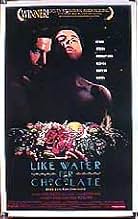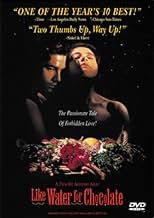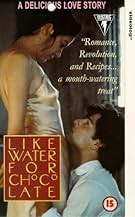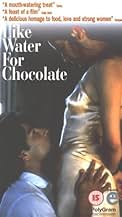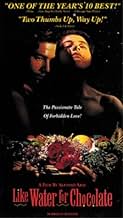IMDb-BEWERTUNG
7,1/10
19.827
IHRE BEWERTUNG
Nachdem der Mann, den sie bewundert, ihre Schwester geheiratet hat, entwickelt eine junge Mexikanerin eine Leidenschaft fürs Kochen und entdeckt, dass sie ihre Gefühle durch das Essen, das s... Alles lesenNachdem der Mann, den sie bewundert, ihre Schwester geheiratet hat, entwickelt eine junge Mexikanerin eine Leidenschaft fürs Kochen und entdeckt, dass sie ihre Gefühle durch das Essen, das sie zubereitet, übertragen kann.Nachdem der Mann, den sie bewundert, ihre Schwester geheiratet hat, entwickelt eine junge Mexikanerin eine Leidenschaft fürs Kochen und entdeckt, dass sie ihre Gefühle durch das Essen, das sie zubereitet, übertragen kann.
- Nominiert für 1 BAFTA Award
- 27 Gewinne & 14 Nominierungen insgesamt
Empfohlene Bewertungen
The two things that stood out for me in this film are the telling of this story and how you had no idea what was going to happen next and of course the performance of Lumi Cavazos. Its one of those rare experiences that stay with you long after you have seen the film. Both strong and self assured. Whats really amazing is that its Cavazos first film role (That I know of, anyway) her natural charm is essential to this story. Not a film for all taste's but a very unique movie overflowing with romantic grandeur.
10Jim B-2
Scenes of incredible beauty and humor. This film appeals to all of humankind's tastes (visual, intellectual, gustatory, sexual, etc.) It is one of the greatest romantic comedies showing the lives, values and beliefs of another culture ever presented as a gift to the American public. Be aware though that it is not an experience that will appeal to everyone. You won't enjoy it if you don't love food, have an imagination and understand that daytime soaps are not art.
Like Water for Chocolate is a masterpiece in that it conveys the essence of our ancestors' knowledge forgotten in the fast pace of modern living.
It centers around the wonder of cooking: a sacred ritual, not a boring chore; and when done right, with love, it creates magic. Raised and taught to cook by her old Mayan nanny, Tita (exquisitely performed by Lumi Cavazos) masters the near-magical ability of transferring her love and other feelings into her creations passed into one who eats them.
The characters senses are so refined, they enable everyone involved in this family drama to be tuned to the finest nuances of their world, opening the door to non-material pleasures. Rich with metaphors, their language reflects the skills of keen and sometimes humorous observation. The story brings our perception to a different level - as its characters' empathy borders on miracles and magic, and things we only sense and feel become real. Tita's virgin breasts, feeling `like dough kneaded' by strong hands, turn into mature breasts under Pedro's burning eyes (to later start lactating) - their glances, just like her food, becoming the means of communicating their forbidden love.
Yet all magic becomes wasted in the face of a man's choice. The Universe may scream into Pedro's ears about the path he is to take, but if he doesn't follow it, no magic can save him. We witness the story of a fatal attraction between two soulmates, whose passion, confined by an enslaving family tradition, lights up everyone around them... But for themselves, it's so intense, it literally engulfs the lovers in flames. Did they have an alternative? It is for the viewer to figure out.
You may ponder, however, over the young doctor's Indian grandmother saying that `each of us is born with a box of matches inside but we can't strike them all by ourselves; we need oxygen and a candle to help. The oxygen would come from a lover's breath; the candle could be a food, a melody, a word, a caress, or a sound...' He remembers her warning, though, that `it is important to light the matches one at a time' because otherwise the heat generated would produce too dazzling a brilliance.
Thus the wisdom of the ages, just like the power, is passed here through women and the men who are in tune with them. And the intense interactions between the colorful characters of five generations extend to dead family members who continue to counsel or despise the living.
When coming into her room with Pedro after 22 years of their waiting for each other, Tita is greeted by her long deceased nanny lighting her bed and the room with multiple candles. And the consequences of one's actions carries on beyond time - as each person continues her path notwithstanding death.
Hot yellow-red colors intermixed with dense lighting rekindle one's passion for living and appreciation for the gifts and mysteries of the Mexican land. The magic realism becomes a way of living in a culture connected with its heritage.
I recommend Like Water for Chocolate to anyone who feels like he/she is lacking color and passion in life - if watched with an open mind and heart, this beautiful and enigmatic film will stir your senses and imagination and light up your box of matches!
It centers around the wonder of cooking: a sacred ritual, not a boring chore; and when done right, with love, it creates magic. Raised and taught to cook by her old Mayan nanny, Tita (exquisitely performed by Lumi Cavazos) masters the near-magical ability of transferring her love and other feelings into her creations passed into one who eats them.
The characters senses are so refined, they enable everyone involved in this family drama to be tuned to the finest nuances of their world, opening the door to non-material pleasures. Rich with metaphors, their language reflects the skills of keen and sometimes humorous observation. The story brings our perception to a different level - as its characters' empathy borders on miracles and magic, and things we only sense and feel become real. Tita's virgin breasts, feeling `like dough kneaded' by strong hands, turn into mature breasts under Pedro's burning eyes (to later start lactating) - their glances, just like her food, becoming the means of communicating their forbidden love.
Yet all magic becomes wasted in the face of a man's choice. The Universe may scream into Pedro's ears about the path he is to take, but if he doesn't follow it, no magic can save him. We witness the story of a fatal attraction between two soulmates, whose passion, confined by an enslaving family tradition, lights up everyone around them... But for themselves, it's so intense, it literally engulfs the lovers in flames. Did they have an alternative? It is for the viewer to figure out.
You may ponder, however, over the young doctor's Indian grandmother saying that `each of us is born with a box of matches inside but we can't strike them all by ourselves; we need oxygen and a candle to help. The oxygen would come from a lover's breath; the candle could be a food, a melody, a word, a caress, or a sound...' He remembers her warning, though, that `it is important to light the matches one at a time' because otherwise the heat generated would produce too dazzling a brilliance.
Thus the wisdom of the ages, just like the power, is passed here through women and the men who are in tune with them. And the intense interactions between the colorful characters of five generations extend to dead family members who continue to counsel or despise the living.
When coming into her room with Pedro after 22 years of their waiting for each other, Tita is greeted by her long deceased nanny lighting her bed and the room with multiple candles. And the consequences of one's actions carries on beyond time - as each person continues her path notwithstanding death.
Hot yellow-red colors intermixed with dense lighting rekindle one's passion for living and appreciation for the gifts and mysteries of the Mexican land. The magic realism becomes a way of living in a culture connected with its heritage.
I recommend Like Water for Chocolate to anyone who feels like he/she is lacking color and passion in life - if watched with an open mind and heart, this beautiful and enigmatic film will stir your senses and imagination and light up your box of matches!
Tita (Lumi Cavazos) was born in the kitchen in 1895 Rio Grande, Mexico. After the death of her father, her mother vows to force her youngest Tita to care for her entire life. Tita grows up in the kitchen with servant Nacha. She falls in love with Pedro Muzquiz but her mother refuses to permit her to marry. Her mother offers older sister Rosaura and Pedro accepts hoping to stay close to Tita. Tita's tears infuse the wedding cake with her sadness.
This has a great magically realism. It's a fable of food, family, and passion. The story is fun and fanciful. Lumi Cavazos is a sweet endearing lead. The only drawback is the limited chemistry in the epic romance. It's probably asking too much. They don't have much time together before they have to be Romeo and Juliet. Then they have to be apart. It's submerged passion and Pedro doesn't always come across well.
This has a great magically realism. It's a fable of food, family, and passion. The story is fun and fanciful. Lumi Cavazos is a sweet endearing lead. The only drawback is the limited chemistry in the epic romance. It's probably asking too much. They don't have much time together before they have to be Romeo and Juliet. Then they have to be apart. It's submerged passion and Pedro doesn't always come across well.
Years ago, in California, I walked into a gas station convenience store to buy some consumable or other. The man who took my money was a Mexican emigre, and he saw that I was carrying a copy of the book Like Water for Chocolate by Laura Esquivel. He asked how I liked it, and I told him I was loving it. He told me not to miss the movie.
"Oh," I answered, "but I always worry that the movie will never be as good as the book."
"It doesn't matter," he told me. "This is a very great film. And it is the first real Mexican film I have ever seen shown in this country. You know, to everybody, not just the Mexican community."
I smiled and told him I would check it out, but honestly, I had no idea what he was talking about. After all, I knew who Dolores Del Rio and Cantinflas were, and the movies with them that I had seen were shown in L.A., to everybody.
But now, at last, I have seen this movie, and now, at last, I know what this guy was talking about. Like, wow! This really is a real Mexican film! Art! Cinema! More than just a bit of popular fluff!
Tender, compassionate and very witty, like the book on which it is based, this movie celebrates Mexican culture -- not just on the food, the preparation of which forms the premise of the story, but as kind of a rollicking take on the history of the young country at the turn of the century. It celebrates the music, the style of life on a ranch, the strength of the extended family, the beauty of the land, and the ethnic mixing pot that is every Mexican.
There is so much reckless joy and passionate love in this film, even when it portrays pain. It openly depicts female eroticism. (Plus, for a big change from US cinema, we get to see beautiful men and women of many shapes, sizes and colors all on the same screen.) The acting is flawless, and the star, Lumi Cavazos, is absolutely charming, full of life and credibility.
The only flaws I found in this film were minor and had to do with timing. For example, the final ascent to the climax seems to have been shortchanged a little bit. I would have liked to reach through this scene a little more slowly.
To judge Mexican cinema by the type of films I had seen before this one would be like judging U.S. cinema on the basis of Jerry Lewis or some cheesy melodramas from the '40s and '50s, but not taking into account any of our real film art. I'd love to know what else I've missed. Can't wait to find out.
"Oh," I answered, "but I always worry that the movie will never be as good as the book."
"It doesn't matter," he told me. "This is a very great film. And it is the first real Mexican film I have ever seen shown in this country. You know, to everybody, not just the Mexican community."
I smiled and told him I would check it out, but honestly, I had no idea what he was talking about. After all, I knew who Dolores Del Rio and Cantinflas were, and the movies with them that I had seen were shown in L.A., to everybody.
But now, at last, I have seen this movie, and now, at last, I know what this guy was talking about. Like, wow! This really is a real Mexican film! Art! Cinema! More than just a bit of popular fluff!
Tender, compassionate and very witty, like the book on which it is based, this movie celebrates Mexican culture -- not just on the food, the preparation of which forms the premise of the story, but as kind of a rollicking take on the history of the young country at the turn of the century. It celebrates the music, the style of life on a ranch, the strength of the extended family, the beauty of the land, and the ethnic mixing pot that is every Mexican.
There is so much reckless joy and passionate love in this film, even when it portrays pain. It openly depicts female eroticism. (Plus, for a big change from US cinema, we get to see beautiful men and women of many shapes, sizes and colors all on the same screen.) The acting is flawless, and the star, Lumi Cavazos, is absolutely charming, full of life and credibility.
The only flaws I found in this film were minor and had to do with timing. For example, the final ascent to the climax seems to have been shortchanged a little bit. I would have liked to reach through this scene a little more slowly.
To judge Mexican cinema by the type of films I had seen before this one would be like judging U.S. cinema on the basis of Jerry Lewis or some cheesy melodramas from the '40s and '50s, but not taking into account any of our real film art. I'd love to know what else I've missed. Can't wait to find out.
Wusstest du schon
- WissenswertesThe original literal title means very little outside Mexico (it refers to the exact boiling temperature water needs to reach in order to make hot chocolate). Therefore, in France the title has been changed into "Bitter Chocolate", in Poland into "Quails in Rose Petals" and in Japan into "The Legend of the Rose Petal Sauce".
- PatzerWhen Dr. Brown holds up a piece of white phosphorus, nothing happens. White phosphorus ignites in air at room temperature, however, so it should have been shown burning.
- Alternative VersionenThe International version is color-corrected, and some voices were re-dubbed in the English spoken language scenes. Includes sex & nudity scenes.
- VerbindungenFeatured in The 50th Annual Golden Globe Awards (1993)
- SoundtracksMi Querida Capitan
Written by José Alfonso Palacios
Top-Auswahl
Melde dich zum Bewerten an und greife auf die Watchlist für personalisierte Empfehlungen zu.
- How long is Like Water for Chocolate?Powered by Alexa
Details
- Erscheinungsdatum
- Herkunftsland
- Offizielle Standorte
- Sprachen
- Auch bekannt als
- Como agua para chocolate
- Drehorte
- Produktionsfirmen
- Weitere beteiligte Unternehmen bei IMDbPro anzeigen
Box Office
- Budget
- 2.000.000 $ (geschätzt)
- Bruttoertrag in den USA und Kanada
- 21.665.468 $
- Eröffnungswochenende in den USA und in Kanada
- 23.600 $
- 21. Feb. 1993
- Weltweiter Bruttoertrag
- 21.744.201 $
- Laufzeit1 Stunde 45 Minuten
- Farbe
- Seitenverhältnis
- 1.85 : 1
Zu dieser Seite beitragen
Bearbeitung vorschlagen oder fehlenden Inhalt hinzufügen




